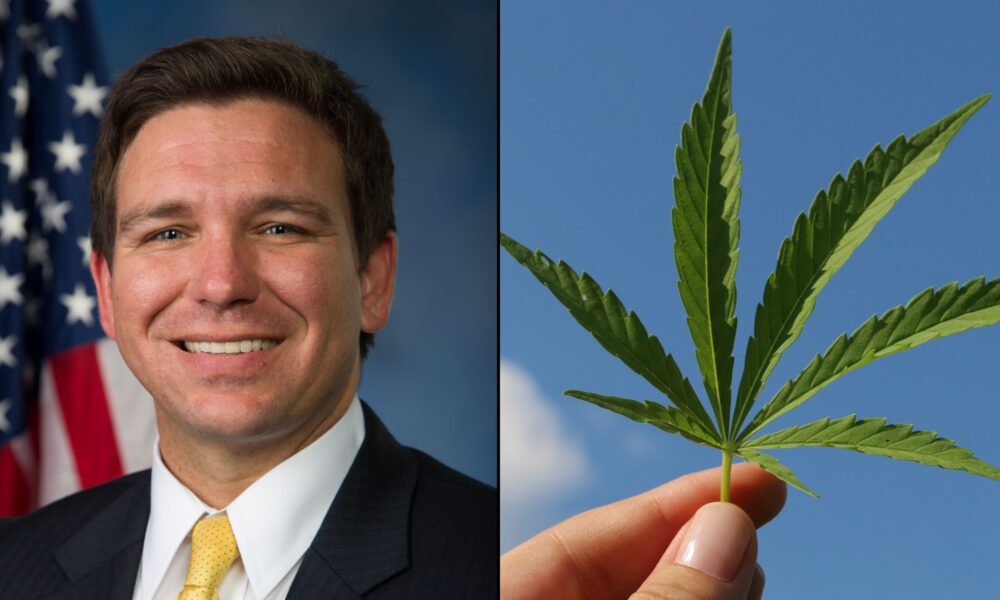The Trump campaign took a swipe at 2024 Republican presidential candidate Ron DeSantis, urging the Florida governor to pick up some marijuana edibles while visiting Nevada to de-stress from the race.
Steven Cheung, spokesperson for former President Donald Trump, made the comments on Saturday, remarking on the stagnant polling numbers for DeSantis.
“Maybe Ron should consider visiting a smoke shop and buy some edibles to take the stress away, something [DeSantis strategist] Jeff Roe should know about since he’s lobbying for marijuana legalization in Iowa,” he said, as Florida Politics first reported.
DeSantis is unlikely to take the Trump campaign official up on his recommendation, as the governor opposes cannabis legalization and said he thinks marijuana smells “putrid.” That said, an edible might not carry the same “pungent odor” he dislikes.
And while Cheung sought to link Nevada marijuana products to the DeSantis strategist’s alleged lobbying activity in Iowa, Roe isn’t listed on that state’s lobbyist database, and marijuana remains illegal in the state for recreational purposes despite it being largely surrounded by other states that have enacted legalization.
Roe’s lobbying firm Axiom Strategies, which has received millions from the pro-DeSantis “Never Back Down” super PAC, has also been paid millions by a campaign to put a marijuana legalization initiative on Florida’s 2024 ballot, as Politico reported. So it’s possible Trump spokesperson Cheung got the states mixed up in his remarks.
Marijuana Moment reached out to Cheung and Roe for clarification, but they did not respond by the time of publication.
In any case, neither Trump nor DeSantis are personally cannabis enthusiasts, though the former president did express some openness to modest reform during his time in office—though his first attorney general did rescind Obama-era guidance that advised prosecutors to generally not intervene in state cannabis laws. He’s also taken a particularly aggressive stance on other drug policy issues, including calling for the execution of people who sell illicit substances.
DeSantis, meanwhile, has vowed that he “would not legalize” marijuana if elected president. In August he argued, contrary to evidence, that the reform has actually increased the size of the illicit market in Colorado.
Florida voters may have the choice to expand access regardless of the governor’s position, as the state Supreme Court is currently considering whether a marijuana legalization initiative will appear on the state’s 2024 ballot. Oral arguments in that case are scheduled for November 8.
DeSantis’s opposition to cannabis legalization—despite recent surveys showing increasing bipartisan support for the reform—is not new. But it’s part of the official’s scattered record on the issue that comes as he fights to maintain his second-place status in the race for the Republican presidential nomination.
On the policy side, for example, a bill DeSantis signed that took effect in Florida in July expanded medical marijuana advertising and manufacturing restrictions to prohibit any products or messages that promote “recreational” cannabis use, while adding more stringent eligibility requirements for workers in the industry.
He separately signed a measure in June that prohibits sober living facilities from allowing residents to possess or use medical marijuana, even if the patient is certified by a doctor to legally use cannabis therapeutically in accordance with state law. All other doctor-prescribed pharmaceutical medications may be permitted, however.
Also in June, the governor signed legislation banning sales of any consumable hemp products—including cannabis “chewing gum”—to people under 21, an expansion of an existing prohibition on young people being able to purchase smokable hemp.
Another bill that DeSantis signed in June did recently result in two Black farmers in Florida being awarded long-awaited medical marijuana business licenses.
Key House Committee Will Consider Ending Marijuana Testing For Federal Job Applicants And Lifting D.C. Cannabis Sales Ban
Read the full article here

